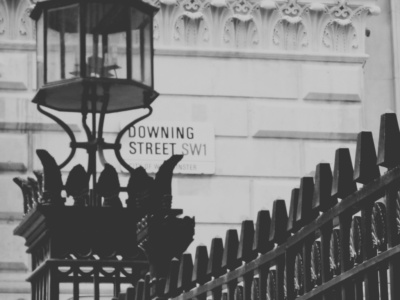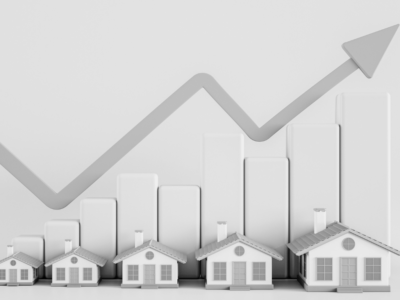The annual percentage change for average UK house prices was 1.9% in the 12 months to May 2023, compared with 3.2% in the 12 months to April 2023.
The average UK house price was £286,000 in May 2023, which is £6,000 higher than 12 months ago, but £7,000 below the recent peak in September 2022.
Average house prices increased over the 12 months to £304,000 (1.7%) in England, to £213,000 in Wales (1.8%), to £193,000 in Scotland (3.2%) and to £172,000 in Northern Ireland (5.0%).
On a non-seasonally adjusted basis, average UK house prices were little changed between April 2023 and May 2023, while average UK house prices increased by 1.3% during the same period 12 months ago.
Annual house price inflation was highest in the North East where prices increased by 4.0% in the 12 months to May 2023.
The East of England was the English region with the lowest annual growth, where prices were little changed in the 12 months to May 2023.
The Royal Institution of Chartered Surveyors’ (RICS’) May 2023 UK Residential Market Survey reported that more survey respondents have seen a fall in buyer enquiries than have seen a rise in buyer enquiries.
Although this is still indicative of a subdued trend in buyer demand, last month’s reading showed a greater proportion of respondents reported a fall in buyer enquiries last month, and the latest month’s report represents the least negative return over the past year.
At region level, virtually all parts of the UK exhibited a less negative reading for new buyer enquiries when compared with the start of the year.
The Bank of England’s Agents summary of business conditions 2023 Q2 reported weaker demand and stronger supply than a year ago, bringing supply and demand closer to balance. This led to more stable prices relative to recent months.
The UK Property Transactions Statistics showed that in May 2023, on a seasonally adjusted basis, the estimated number of transactions of residential properties with a value of £40,000 or greater was 80,020.
This is 27.0% lower than 12 months ago (May 2022). Between April 2023 and May 2023, UK transactions decreased by 2.7% on a seasonally adjusted basis.
The Bank of England’s Money and Credit May 2023 release reported that mortgage approvals for house purchases, an indicator of future borrowing, increased to 50,500 in May 2023, from 49,000 in April 2023.
England
In England, the May data shows that, on average, house prices have fallen 0.4% since April 2023.
The annual price rise of 1.7% takes the average property value to £303,557.
The regional data for England indicates that:
- the West Midlands experienced the greatest monthly price rise with an increase of 0.5%
- London saw the most significant monthly price fall, with a movement of -1.2%
- the North East experienced the greatest annual price rise, up by 4.0%
- the East of England saw the lowest annual price growth, with an increase of 0.0%
Price change by region for England
| Region | Average price May 2023 | Annual change % since May 2022 | Monthly change % since April 2023 |
|---|---|---|---|
| East Midlands | £247,242 | 3.4 | 0.3 |
| East of England | £345,710 | 0.0 | -0.8 |
| London | £525,629 | 0.8 | -1.2 |
| North East | £158,779 | 4.0 | -1.0 |
| North West | £211,790 | 2.7 | -0.2 |
| South East | £388,873 | 1.5 | -0.9 |
| South West | £323,765 | 1.0 | -0.2 |
| West Midlands | £248,166 | 2.2 | 0.5 |
| Yorkshire and the Humber | £204,588 | 1.2 | -0.4 |
Repossession sales by volume for England
The lowest number of repossession sales in March 2023 was in the East Midlands and East of England.
The highest number of repossession sales in March 2023 was in the North East.
| Repossession sales | March 2023 |
|---|---|
| East Midlands | 2 |
| East of England | 2 |
| London | 14 |
| North East | 19 |
| North West | 17 |
| South East | 16 |
| South West | 3 |
| West Midlands | 8 |
| Yorkshire and the Humber | 11 |
| England | 92 |
Average price by property type for England
| Property type | May 2023 | May 2022 | Difference % |
|---|---|---|---|
| Detached | £478,030 | £468,773 | 2 |
| Semi-detached | £289,575 | £285,968 | 1.3 |
| Terraced | £247,907 | £244,456 | 1.4 |
| Flat/maisonette | £249,976 | £245,322 | 1.9 |
| All | £303,557 | £298,596 | 1.7 |
Funding and buyer status for England
| Transaction type | Average price May 2023 | Annual price change % since May 2022 | Monthly price change % since April 2023 |
|---|---|---|---|
| Cash | £284,143 | 1.4 | -0.4 |
| Mortgage | £313,219 | 1.8 | -0.5 |
| First-time buyer | £251,894 | 1.7 | -0.3 |
| Former owner occupier | £348,052 | 1.6 | -0.6 |
Building status for England
| Building status | Average price March 2023 | Annual price change % since March 2022 | Monthly price change % since February 2023 |
|---|---|---|---|
| New build | £439,033 | 19.5 | 0.8 |
| Existing resold property | £295,748 | 3.2 | -1.3 |
London
London shows, on average, house prices have fallen 1.2% since April 2023.
An annual price rise of 0.8% takes the average property value to £525,629.
Average price by property type for London
| Property type | May 2023 | May 2022 | Difference % |
|---|---|---|---|
| Detached | £1,061,480 | £1,073,598 | -1.1 |
| Semi-detached | £668,721 | £678,595 | -1.5 |
| Terraced | £573,105 | £571,469 | 0.3 |
| Flat/maisonette | £439,987 | £431,469 | 2.0 |
| All | £525,629 | £521,561 | 0.8 |
Funding and buyer status for London
| Transaction type | Average price May 2023 | Annual price change % since May 2022 | Monthly price change % since April 2023 |
|---|---|---|---|
| Cash | £546,177 | 1.3 | -0.6 |
| Mortgage | £518,898 | 0.7 | -1.4 |
| First-time buyer | £453,057 | 0.9 | -1.2 |
| Former owner occupier | £604,633 | 0.6 | -1.3 |
Building status for London
| Building status | Average price March 2023 | Annual price change % since March 2022 | Monthly price change % since February 2023 |
|---|---|---|---|
| New build | £607,043 | 16.5 | -0.3 |
| Existing resold property | £517,783 | 0.4 | -1.9 |
Wales
Wales shows, on average, house prices have risen by 0.6% since April 2023.
An annual price rise of 1.8% takes the average property value to £213,374.
There were 6 repossession sales for Wales in March 2023.
Average price by property type for Wales
| Property type | May 2023 | May 2022 | Dfference % |
|---|---|---|---|
| Detached | £326,767 | £320,304 | 2 |
| Semi-detached | £205,423 | £203,512 | 0.9 |
| Terraced | £167,078 | £163,720 | 2.1 |
| Flat/maisonette | £136,517 | £133,100 | 2.6 |
| All | £213,374 | £209,599 | 1.8 |
Funding and buyer status for Wales
| Transaction type | Average price May 2023 | Annual price change % since May 2022 | Monthly price change % since April 2023 |
|---|---|---|---|
| Cash | £205,800 | 1.6 | 0.6 |
| Mortgage | £217,724 | 1.9 | 0.6 |
| First-time buyer | £183,564 | 1.7 | 0.9 |
| Former owner occupier | £248,540 | 2.0 | 0.3 |
Building status for Wales
| Building status | Average price March 2023 | Annual price change % since March 2022 | Monthly price change % since February 2023 |
|---|---|---|---|
| New build | £339,170 | 21.1 | 1.1 |
| Existing resold property | £209,387 | 4.8 | -0.4 |
Director of Benham and Reeves, Marc von Grundherr, comments:
“The pandemic property rollercoaster ride has certainly ground to a halt so far in 2023, but rather than the market coming off the rails, what we’re now seeing is house prices returning to pre-pandemic levels.”
Managing Director of Barrows and Forrester, James Forrester, comments:
“Many buyers and sellers remain in property market limbo at present and it’s become a bit of a waiting game on both sides.
Buyers are waiting to see if mortgage rates level out in order to boost their purchasing power, while sellers are hoping that they will achieve a better price once the economic storm clouds have passed.”
Managing Director of House Buyer Bureau, Chris Hodgkinson, comments:
“We’re currently seeing the scenario that many predicted towards the backend of last year, whereby the market is at a bit of a standstill.
House prices aren’t crashing by any means, but a drop in market activity has also caused them to stall.
For those who are looking to sell, a good price is still very achievable, it’s finding a buyer who is in a proceedable position that is the biggest challenge at present.”
Jason Ferrando, CEO of easyMoney comments:
“Inflation has finally started to subside and while we’re not out of the woods yet, this should bring an air of optimism to the nation’s homebuyers and sellers.
The market remains in good health all things considered and once mortgage rates start to fall this should rejuvenate buyer appetites, delivering a much needed boost of market activity which in turn will help cultivate property values once again.”
Tomer Aboody, director of property lender MT Finance, comments:
“Although property prices still managed to rise slightly over the past year, these figures illustrate the reduction in buyer confidence.
As the market gets to grips with constant negativity in terms of rising interest rates and high inflation, we will see a slowdown in property transactions.
Something needs to change in order to inject some fuel into the market, as sales volumes are nearly half what they were this time last year.
The property market is the backbone of the UK economy and can’t be allowed to grind to a complete halt.”
Chris Druce, senior research analyst at Knight Frank, comments:
“With average borrowing costs now above the level seen after a spike after last September’s poorly received mini-Budget sentiment has weakened and UK house price growth continues to moderate.
Today’s CPI inflation data, which showed a fall from 8.7% to 7.9%, suggests that we’re on course to reach peak rates sooner rather than later.
However, we’re not there yet.
Until we are the associated uncertainty will make it hard for buyers to plan and lead to further hesitation in the market, keeping downwards pressure on prices.
We expect house prices to fall by 10% over this year and next, although strong wage growth, low unemployment and the forbearance of lenders will make steeper falls than this unlikely.”
Anna Clare Harper, CEO of GreenResi, comments:
“This significant slowdown in growth is a direct result of increased interest rates, which have stretched housing affordability.
Higher interest rates impact those who already own a property: many are facing double or triple their previous housing costs.
It also impacts new purchasers as those reliant on bank finance are no longer willing or able to pay the price level we adjusted to in 2022.
Sales volumes have fallen by about a third in the past year.
Investors we are dealing with are purchasing at 20 to 30 per cent below peak 2022 market values, and only those who need to sell in this market are selling.
Only cash purchasers are not directly affected in terms of their ability to pay.
This is a price correction following the mini bubble caused by Covid and Stamp Duty reductions, which created double-digit house price growth for much of the last three years.
As a result, it is a time for homeowners and investors to review their affordability and mortgage terms and plan for the future, but not a time to panic.”
Jeremy Leaf, north London estate agent and a former RICS residential chairman, comments:
“This most comprehensive yet historic house price survey shows clearly the impact of stubbornly high inflation on mortgage rates and the knock-on effect on confidence which is keeping house prices in check.
On the ground, appetite remains but worries over how far and how fast repayments will rise is highly relevant.
Meanwhile, many sellers are not prepared to reduce to what is clearly a new market ’norm’.
Better-than-expected inflation news is welcome, particularly if the figures can be sustained over the next few months.
However, the fall may not be enough to stop further albeit modest interest rate rises in the near future.”
Mark Harris, chief executive of mortgage broker SPF Private Clients, comments:
“Finally, inflation is not only moving in the right direction but has picked up some pace.
Swap rates have been calmer in the past few days, resulting in fewer product pulls from lenders.
It seems as though all eyes are on the latest inflation figures to determine what happens next and whether recent market volatility has settled.
The markets have reacted favourably this morning, with five-year Swaps falling to 4.74 per cent from 4.97 per cent yesterday.
If Swaps continue to move in this direction, some lenders may start to reduce pricing.
There is a strong argument for the Bank of England to pause interest rate rises for now, giving the market time to settle down and adjust.
Consecutive base rate rises have been painful; it’s time to let them take effect, rather than causing continued anxiety and distress for borrowers.”






















Comments